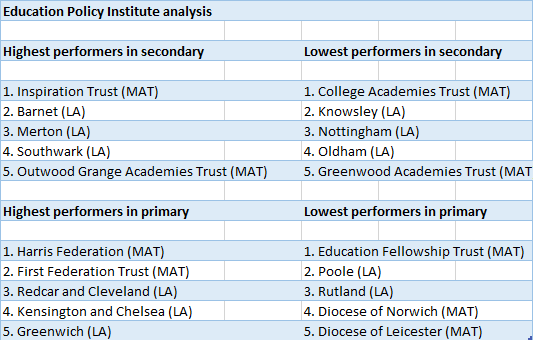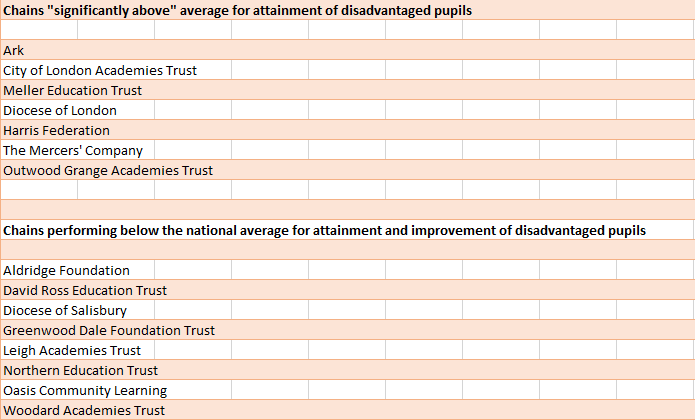Twenty of the largest multi-academy trusts (MATs) – running more than 300 schools – fall “significantly below” the national average for improving pupils’ attainment, a major new analysis comparing the performance of MATs and councils has found.
The findings, published today by think tank the Education Policy Institute (EPI), revealed stark variations in the performance of individual academy trusts, as well as local authorities.
The study was released alongside a separate analysis of how academy trusts are serving disadvantaged pupils by education charity the Sutton Trust.
It found eight of 39 academy chains investigated were performing “substantially below” the national average for attainment and improvement of disadvantaged pupils.
The reports’ authors say both findings pose challenging questions for the government’s academies programme and have called for a “radical shake-up”.
They have tabled recommendations (in full below) that include urging the government to ditch its “objective” for full academisation, and to allow high-performing local authorities to set up academy trusts.
The publication comes on the same day the department is due to publish its own MAT league tables.
David Laws, EPI chairman and former schools minister, said his organisation’s performance league tables found academy trusts were “over represented” among both the best and worst performers.

Academy trusts made up 12 of the top 30 primary school groups and six of the top 20 secondary groups.
In terms of low performers, they made up nine of the lowest 23 primary school groups and nine of the lowest 20 secondary school groups.
Laws said: “It is dangerous to assume that simply moving somebody from any local authority to a MAT is going to have a good impact on attainment.”
The analysis found 20 academy trusts fall significantly below national averages for improvement in value-added scores in either key stage 2 or key stage 4.
He said this will make “uncomfortable reading” for the government, adding it needs to have a “strategy as to whether or not it is going to terminate those MATs or rebroker all of the schools”.
The findings make uncomfortable reading for the government
The EPI analysis found Harris Federation was the best-performing trust at primary level and the Inspiration Trust topped the secondary table (both pictured right).
Harris said it has a shared culture of high expectations and resolving challenges quickly and the Inspiration Trust said their approach focuses on “core standards, behaviour, and strong teaching, while also ensuring students have access to sports and cultural activities”.
Inspiration’s chair, Sir Theodore Agnew, recently joined the EPI as a trustee.
The lowest performing at primary level was the Education Fellowship Trust, and at secondary level the College Academies Trust.
Lizzie Rowe, chief operating officer of Education Fellowship, said the trust is making a “transformational difference” at their schools, but added: “We are a new trust working within an area of neglect and deprivation by all political bodies. It takes … bravery of time to transform communities so children arrive ready to learn.”
Top performing councils included Redcar and Cleveland, Barnet and Merton.
The Sutton Trust analysis also presented a mixed picture. It looked into the attainment data for pupils at the 39 academy chains which had three or more academies that had belonged to the trust from 2013 to 2015.
Eight chains were found to perform below the national average for both attainment and improvement for disadvantaged pupils (in the table right), while five performed above the average.
Professor Becky Francis, director of the UCL-Institute of Education and one of the report’s authors, said: “The government and regional schools commissioners must take firm action to learn from successful chains and to intervene in those that are not succeeding.”

The recommendations
Report: School performance in multi-academy trusts (MATs) and local authorities (LAs)
Author: The Education Policy Institute
What it measured: Analysis of more than 50 MATs and 120 LAs on how their schools’ value-added score and its improvement over time
Policy recommendations:
- Ditch full academisation as a policy objective in favour of ensuring all pupils are in a good school
- Ensure government intervention mechanisms target underperformance in any schools, not just local authority-maintained schools
- Consider allowing high-performing local authorities to become academy trusts
- Focus on understanding what drives high performance in trusts and use this intelligence to create more high-quality trusts that can help the lowest performing
Report: Chain effects 2016
Author: The Sutton Trust
What it measured: The performance of disadvantaged pupils in 39 multi-academy trusts from 2013-15
Policy recommendations:
- Create a taskforce, led by the national schools commissioner, of senior leaders for successful trusts to mentor those struggling
- Allow regional schools commissioners to expand their pools of school improvement providers beyond solely academy sponsors
- Make sponsor accountability processes more transparent
- Enable parents to assess the quality of chains and allow Ofsted to publish the data



Your thoughts